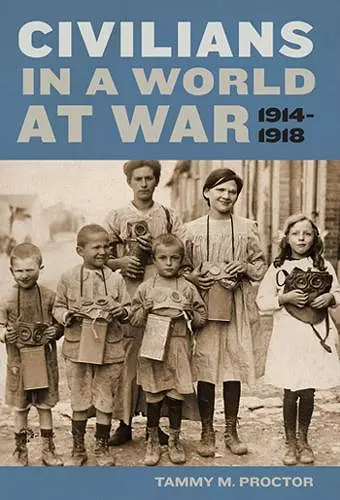Civilians in a World at War, 1914-1918
Format:Hardback
Publisher:New York University Press
Published:30th Aug '10
Currently unavailable, and unfortunately no date known when it will be back

An evocative exploration of the many roles played by civilians across the globe during World War I
World War I heralded a new global era of warfare, consolidating and expanding changes that had been building throughout the previous century, while also instituting new notions of war. The 1914-18 conflict witnessed the first aerial bombing of civilian populations, the first widespread concentration camps for the internment of enemy alien civilians, and an unprecedented use of civilian labor and resources for the war effort. Humanitarian relief programs for civilians became a common feature of modern society, while food became as significant as weaponry in the fight to win.
Tammy M. Proctor argues that it was World War I—the first modern, global war—that witnessed the invention of both the modern “civilian” and the “home front,” where a totalizing war strategy pitted industrial nations and their citizenries against each other. Civilians in a World at War, 1914-1918, explores the different ways civilians work and function in a war situation, and broadens our understanding of the civilian to encompass munitions workers, nurses, laundresses, refugees, aid workers, and children who lived and worked in occupied zones, on home and battle fronts, and in the spaces in between. Comprehensive and global in scope, spanning the Eastern, Western, Italian, East African, and Mediterranean fronts, Proctor examines in lucid and evocative detail the role of experts in the war, the use of forced labor, and the experiences of children in the combatant countries.
As in many wars, civilians on both sides of WWI were affected, and vast displacements of the populations shaped the contemporary world in countless ways, redrawing boundaries and creating or reviving lines of ethnic conflict. Exploring primary source materials and secondary studies of combatant and neutral nations, while synthesizing French, German, Dutch, and English language sources, Proctor transcends the artificial boundaries of national histories and the exclusive focus on soldiers. Instead she tells the fascinating and long-buried story of the civilian in the Great War, allowing voices from the period to speak for themselves.
Civilians in a World at Warprovides an engaging international overview of civilians' experiences between 1914 and 1918, and will be of interest to both scholarly and non-academic readers. -- Claudia Siebrecht * European History Quarterly *
A welcome addition to the scholarship on the Great War. It is a must-read for any graduate students studying the conflict. -- Christopher Fischer * Journal of World History *
It is important to recognize the breadth of possible civilian experiences, and Proctor certainly achieves this. -- David Mongor * Journal of Contemporary History *
Proctor has pieced together a beautiful book...[her] final achievement is not to simply give these women a voice but to establish herself as one of the most important historians of the Great War. -- Nicole Dombrowski Risser * The Journal of Modern History *
Tammy M. Proctor's Civilians in a World at War is a thoughtful and intelligent synthesis which considers both the variety of civilian experiences and the way in which the First World War shaped and reshaped the very concept of 'civilian.' Proctor's work ranges widely across existing secondary literature but also includes significant archival investigation of sources, some of which are familiar and some less so. This is emphatically not just a survey of the various 'Home Fronts' but rather a consideration of what it was to be a civilian in this great global conflict. -- Adrian Gregory * First World War Studies *
In this excellent, astute work, historian Proctor explains that the creation of citizen-armies by widespread international conscription and recruiting campaigns during WWI ensured that noncombatants also were mired in warfare, taking over the responsibilities of men who had been called up, sustaining at long distance the morale of their loved ones in uniform, dealing with food rationing and epidemics, or providing medical care, entertainment or sex to troops who were far from their homes. -- E.J. Jenkins * Choice Magazine *
Carefully researched and well-organized, Civilians in a World at War is an excellent overview of the effects of World War I on civilians. Combining specific stories and life experiences with a detailed discussion of the changes, the author provides insight inot one of the most important developments in the 20th century - what she terms the invention of the modern civilian. -- J.W. Thacker * Park City Daily News *
A powerful and important book that turns our attention to the often understudied experiences of civilians at war. Civilians in a World at War, 1914-1918, makes a major contribution not only to the history of World War I but to the history of civilians involved in war before and since. -- Michael S. Neiberg,author of Fighting the Great War: A Global History
Proctor offers a comprehensive analysis of the impact of World War I on the ways men and women not in uniform functioned in an environment that pitted not only armies but citizens against each other. This is easily the best work of its kind to emerge from the new generation of scholars who are expanding the horizons of Great War studies. -- Dennis Showalter,Colorado College
ISBN: 9780814767153
Dimensions: unknown
Weight: 658g
377 pages